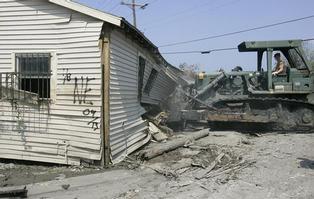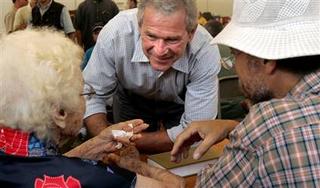Mayor Ray Nagin halted the return of residents to New Orleans on Monday, citing the threat from the strengthening Tropical Storm Rita. The move came as state and federal officials -- including President Bush -- raised concerns that Nagin's plan to return evacuees to the devastated city was coming too soon. Nagin planned for about 180,000 people to return within the week.

Traffic heading into New Orleans was backed up Monday along Interstate 10.
Full Story
A disturbing view from inside FEMA 
A gas refinery building in St. Bernard, Louisiana.

Reba Burke drinks with friends at Patout's Restaurant in the French Quarter Friday.

Even after Michael Brown's departure as head of FEMA, criticism of the government's response to the disaster keeps rising like the unstoppable floodwaters. It threatens to swamp other officials involved in the recovery effort, at every level of government -- federal, state and local.
Full Story
Hurricane victims in New Orleans say police blocked them from crossing a bridge to Gretna.

After Hurricane Katrina put most of New Orleans under water and filled two rapidly deteriorating shelters with thousands, Mayor Ray Nagin urged others still in the city to flee over a Mississippi River bridge to dry ground. But some evacuees said they were blocked by police with guns drawn.
FULL STORY

Louisiana Army National Guard Spl. William Lanoux operates a bulldozer as he clears the road of a house that was washed off its foundation in the 9th Ward of New Orleans on Tuesday, Sept. 13, 2005. The 9th Ward was one of the most heavily flooded portions of the city, and parts of it are now drained. (AP Photo/Ann Heisenfelt)
Michael Brown resigned under a hail storm of criticism over federal response to Hurricane Katrina and President Bush today claimed responsibility for any federal failures. But there is plenty more blame that will hit officials at all levels of government and more could lose their jobs.

New Orleans neighborhoods remain flooded two weeks after the hurricane hit.

President Bush talks with Helen DeDeaux, left, 94, and her son Lee DeDeaux during a visit to a food distribution center in Gulfort, Miss., on Monday.
Susan Walsh / AP
White and black Americans view Hurricane Katrina's aftermath in starkly different ways, with more blacks viewing race as a factor in problems with the federal response, according to a newly released CNN/USA Today/Gallup poll. More blacks than whites said they were angry about the government's response to Katrina, 76 percent to 60 percent, and President Bush is one target of their ire.

The sun sets Monday over a virtually deserted New Orleans two weeks after it was flooded.
FULL STORY

FEMA director Mike Brown

Bush and other officials tour New Orleans today.
Families uprooted by Katrina looking for a place to live in state capital, sending prices surging.

A Garden District home is consumed by flames Tuesday.

NEW ORLEANS (AP) — Nearly two weeks after Hurricane Katrina's onslaught, Sunday was marked by signs that hopelessness was beginning to lift in this shattered city. While the final toll from the disaster remains unknown, there were indications New Orleans had begun to turn a corner.
Complete Story
Slide Show

President Bush arrives aboard the USS Iwo Jima Sunday and will view relief efforts on Monday.

A crew motors down Peoples Avenue in New Orleans to search for survivors and bodies.

A'Mahd Magee, center, 7 months old, is greeted by his father, Robert Magee, left, holding daughter, Ashanta Magee, left as the child's mother, Stacy Nolan, right, reaches out to A'Mahd, Tuesday, Sept. 6, 2005, in Addison, Texas. A'Mahd arrived in Texas by private plane to be reunited with his family.

Eric Gay / AP
Evelyn Turner cries alongside the body of her common-law husband, Xavier Bowie, after he died in New Orleans on Aug. 30. Bowie, who had lung cancer, died when he ran out of oxygen the day after Hurricane Katrina made landfall.

A tugboat retrieves oil barges and contains oil leaks in Plaquemines Parish, Louisiana.

An equipment operator picks up trash outside the New Orleans convention center.

Wendell Pruitt delivers mail in a storm-wrecked neighborhood in Biloxi, Mississippi.

Floodwaters surround a sign that normally welcomes tourists to New Orleans.

Red Cross volunteers work as Katrina survivors rest on cots at the Houston Astrodome.

A U.S. Navy Seabee discards spoiled goods from the Naval Construction Battalion Center Gulfport Commissary Sept. 4, 2005. Katrina's growing costs are likely to approach $200 billion in the next couple of weeks.
Paul Williams / AP

Coast Guard Adm. Thad Allen will head up on-site Hurricane Katrina relief efforts.

Biloxi has weathered many a storm during its 300-year history, and our people have proven their resiliency time and again. We’ll meet this unprecedented natural disaster with an unprecedented response. We’ll overcome this setback, and we’ll be defined not so much by the devastation of this storm, but how we rebuilt our community.
It’s going to be a long process, but Biloxi is on the way back.
God bless you, God bless Biloxi, and God bless America.
Link To Website































